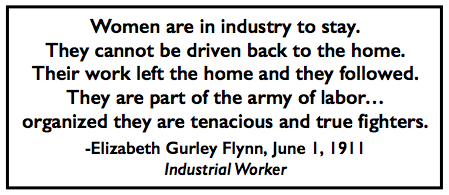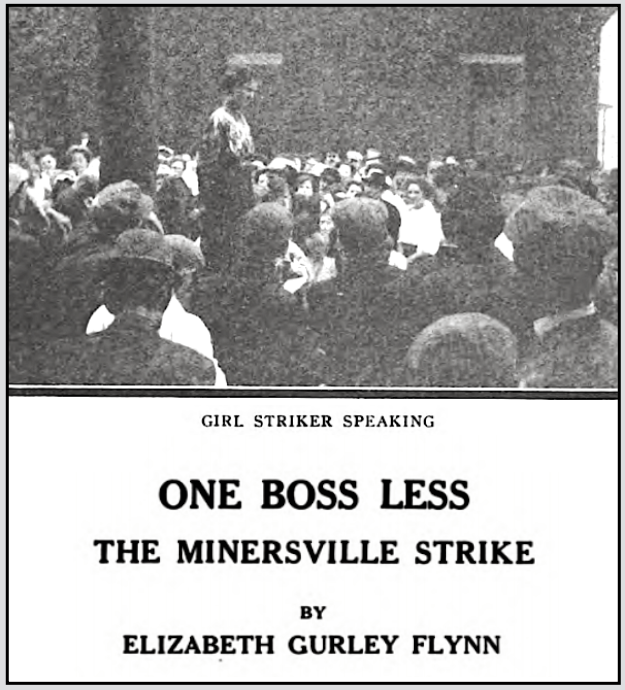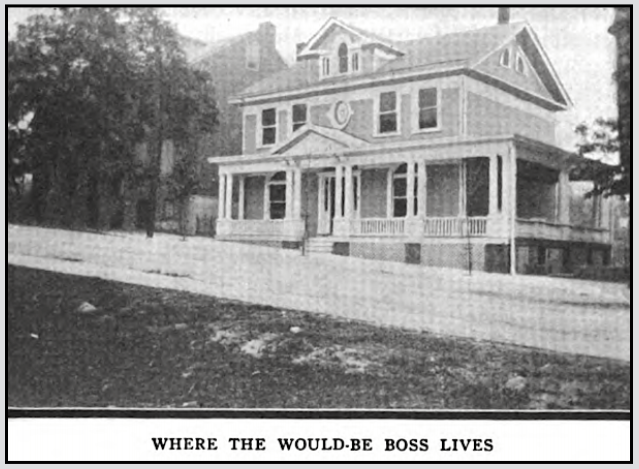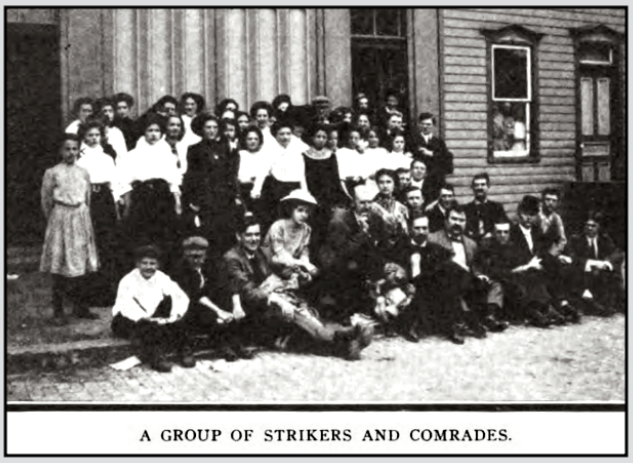 —————
—————
Hellraisers Journal – Saturday July 1, 1911
Elizabeth Gurley Flynn on Strike by Young Girls at Minersville, Pennsylvania
From the International Socialist Review of July 1911:
[Part I of II.]
THE particular employer engaged in this conflict is typical. Over twelve years ago he came to Minersville and opened a factory. Since that time a chain of factories have been installed throughout the anthracite regions and the farming belt that lies South of Pottsville, absorbing all the unused labor of women and girls, who previously engaged in domestic tasks at home, until, through marriage, they established homes of their own.
Dependent for a living upon brothers, fathers and husbands, the factory gate seemed the door of opportunity to them. Life had been a stepping from their father’s threshold to their husband’s, a sheltered, healthy, but often monotonous and uneventful existence. Many of the younger generation were educated in the public schools and felt the lure of the big cities; others were not satisfied with the domestic life, and so the factory spelled a varied experience, a wider life and independence. They welcomed it eagerly and were engulfed in its hungry maw.
When Coombs came to Minersville he was poor and unknown. He was financed by a man named Phillips, a Jewish oculist and rabbi, who likewise commenced his career poor. But running expenses of shirt and underwear factories are less in Pennsylvania towns than in New York or Philadelphia, and girls are cheaper. In the large cities girls are supposed to secure at least a living wage, as most of them are dependent solely upon their earnings. Often they do not, and lives of shame and horror are the result. But the majority attempt to secure it, and a pretence is made by the employers to pay it. Not so here. Wages are simply fit for spending money and do not nearly equal living expenses. The girls still live at home. They have lost the illusion of being self-supporting, and make no pretense of being. They are as dependent on their families as ever they were. and the outrageous condition prevails of miners and farmers raising and caring for daughters to turn them over to the factory owners as instruments of production, practically free of charge.
They lend their children to Coombs and Phillips, and receive them back physical wrecks, hollow-eyed, flat-chested, nervous from overwork. Young girls are taken from schools at a tender age and crushed in the industrial prisons that disfigure the hills and valleys. The vitality of future generations is sapped through the grinding toil these future mothers must endure. From every point of view—financially, physically and morally—these factories have been a blight and a curse to every region they invade.
At first, Coombs employed the girl operators at twelve cents per dozen pieces, but they made too much at this rate, and were reduced to ten cents, and finally to eight. Working day and night on piece work, one girl was able to earn twenty-four dollars in two weeks at the ten-cent rate, and Mr. Coombs quotes this astounding amount as an instance of the good wages the girls earned, but he conveniently forgot the little girls of fifteen and sixteen years, who earned as low as $1.50 and $2.00 per week, and all the others graded between this and $9 earned by the forewoman. Ignorant of unionism and completely unorganized, the girl operators courageously refused to work for the eight cents, and deserted the factory. They formulated their demands for the ten-cent scale, and included a recognition of their personal rights, which had been ruthlessly trampled upon. More is involved in this strike than a question of wages.
I have been informed by one of the forewomen that Coombs was accustomed to use the vilest of profanity to drive the girls to greater efforts, and would grab their scarfs, even tearing them to shreads. In one case he shook a girl so severely that she went into hysterics.
For twelve weeks these operators have been out. Soon they realized that as long as the cutters, binders, pressers and teamsters remained at work, Coombs could the more easily replace them, and as a result of a great open-air mass meeting, addressed by Con F. Foley, of Pottsville, and myself, in which the entire population enthusiastically participated, a general tie-up was effected. The factory is closed from cellar to roof.
—————
[Emphasis added.]
~~~~~~~~~~~~~~~~~~~~
SOURCES & IMAGES
Quote EGF Organize Women, IW p4, June 1, 1911
https://www.marxists.org/history/usa/pubs/industrialworker/iw/v3n10-w114-jun-01-1911-IW.pdf
International Socialist Review
(Chicago, Illinois)
-July 1911, page 8
https://www.marxists.org/history/usa/pubs/isr/v12n01-jul-1911-ISR-H-GR-ocr.pdf
See also:
Words on Fire
The Life and Writing of Elizabeth Gurley Flynn
-ed by Rosalyn Fraad Baxandal
Rutgers U Press, 1987
(search: “minersville strike”
https://books.google.com/books?id=mqbaAAAAMAAJ
~~~~~~~~~~~~~~~~~~~~~~~~~~~~~~~~~~~~~~~~
Rebel Girl – Alyeah Hansen
Lyrics by Joe Hill



